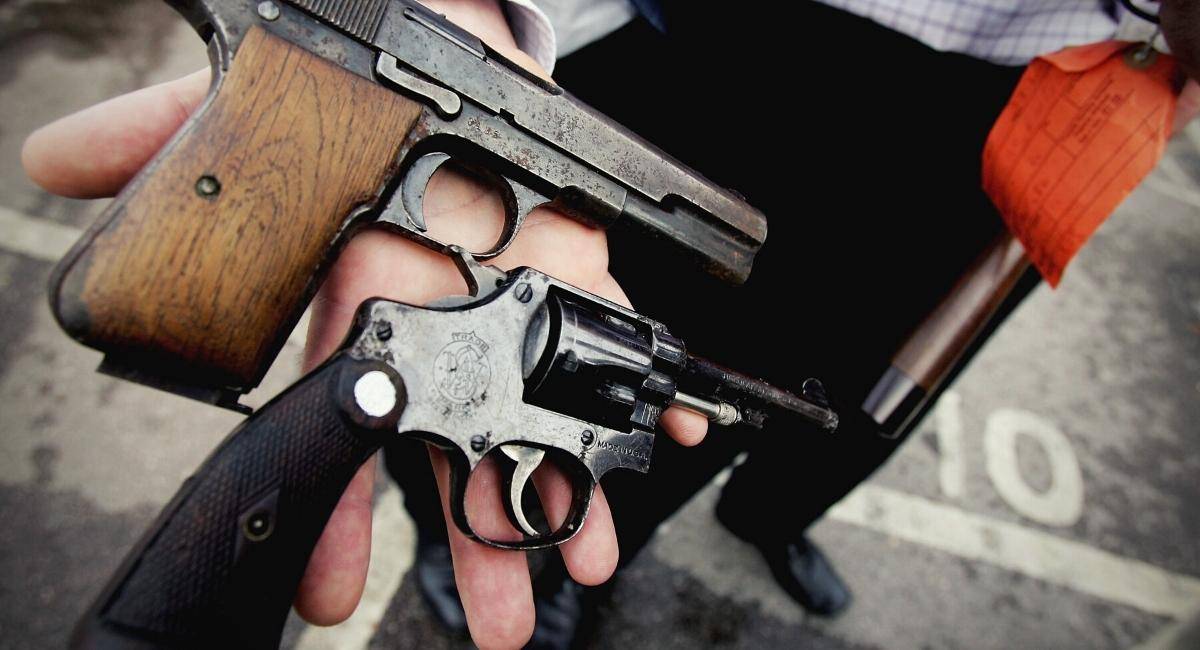It is no secret that Texas allows its residents to own and possess firearms with very few limitations, but there are still important rules people must follow to be in compliance with the law. A major concern for gun owners can be drinking alcohol while in possession of a firearm are the repercussions.
The crime of unlawful carrying weapons is often abbreviated as just UCW, but the unlawful carrying of a handgun by a license holder is not the same offense as possession of a firearm while intoxicated. Possession of a firearm while intoxicated can result in misdemeanor charges that still need to be taken seriously.
Possession of a Firearm While Intoxicated Defense Lawyer in Plano, Allen, Frisco, and McKinney, TX
If you were arrested for alleged possession of a firearm while intoxicated, contact the Law Offices of Richard C. McConathy today at (469) 304-3422 for a consultation about your alleged offense in Plano, Allen, Frisco, McKinney, TX, and surrounding areas of Collin County, Texas.
Possession of Firearm While Intoxicated Charges in Texas
Under Texas Penal Code § 46.035(d), a license holder commits a criminal offense if, while intoxicated, they carry a handgun under the authority of Subchapter H of Chapter 411 of the Texas Government Code, regardless of whether their handgun is concealed or carried in a shoulder or belt holster. This crime will be a Class A misdemeanor.
The same law further establishes that a license holder commits a crime if they carry a handgun on or about their person under the authority of Subchapter H of Chapter 411 of the Texas Government Code and intentionally display a handgun in plain view of another person in a public place. It may be an exception that a handgun was partially or wholly visible but was carried in a shoulder or belt holster by the license holder.
A license holder can also commit a crime if they carry a partially or wholly visible handgun, regardless of whether their handgun is holstered, on or about the license holder’s person under the authority of Subchapter H of Chapter 411 of the Texas Government Code, and intentionally display the handgun in plain view of another person on the premises of an institution of higher education or private or independent institution of higher education; or on any public or private driveway, street, sidewalk or walkway, parking lot, parking garage, or other parking areas of an institution of higher education or private or independent institution of higher education.
A license holder commits another offense if they carry a handgun on the campus of a private or independent institution of higher education in Texas that has established rules, regulations, or other provisions prohibiting license holders from carrying handguns pursuant to Texas Government Code § 411.2031(e), or on the grounds or building on which an activity sponsored by such an institution is being conducted, or in a passenger transportation vehicle of such an institution, regardless of whether the handgun is concealed, provided the institution gives effective notice.
A license holder also commits an offense if they intentionally carry a concealed handgun on a portion of premises located on the campus of an institution of higher education in Texas on which the carrying of a concealed handgun is prohibited by rules, regulations, or other provisions established under Texas Government Code § 411.2031(d-1), provided the institution gives effective notice under Texas Government Code § 30.06 with respect to that portion.
A license holder also commits an offense if they intentionally, knowingly, or recklessly carry a handgun under the authority of Subchapter H of Chapter 411 of the Texas Government Code, regardless of whether the handgun is concealed or carried in a shoulder or belt holster, on or about the license holder’s person on the premises of a business that has a permit or license issued under Chapter 25, 28, 32, 69, or 74 of the Texas Alcoholic Beverage Code, if the business derives 51 percent or more of its income from the sale or service of alcoholic beverages for on-premises consumption, as determined by the Texas Alcoholic Beverage Commission under Section 104.06, Alcoholic Beverage Code; on the premises where a high school, collegiate, or professional sporting event or interscholastic event is taking place, unless the license holder is a participant in the event and a handgun is used in the event; on the premises of a correctional facility; on the premises of a hospital licensed under Chapter 241, Health and Safety Code, or on the premises of a nursing facility licensed under Chapter 242, Health and Safety Code, unless the license holder has written authorization of the hospital or nursing facility administration, as appropriate; in an amusement park; or on the premises of a civil commitment facility.
A license holder commits another offense if they intentionally, knowingly, or recklessly carry a handgun under the authority of Subchapter H of Chapter 411 of the Texas Government Code, regardless of whether the handgun is concealed or carried in a shoulder or belt holster, in the room or rooms where a meeting of a governmental entity is held and if the meeting is an open meeting subject to Chapter 551 of the Texas Government Code. The entity provided notice as required by that chapter.
The phrase “amusement park” is defined as a permanent indoor or outdoor facility or park where amusement rides are available for use by the public that is located in a county with a population of more than one million, encompasses at least 75 acres in surface area, is enclosed with access only through controlled entries, is open for operation more than 120 days in each calendar year, and has security guards on the premises at all times. The term does not include any public or private driveway, street, sidewalk or walkway, parking lot, parking garage, or other parking areas. “Institution of higher education” and “private or independent institution of higher education” have the meanings assigned by Texas Education Code § 61.003, which are any public technical institute, public junior college, public senior college or university, medical or dental unit, public state college, or other agency of higher education as defined in this section for an institution of higher education while the private or independent institution of higher education includes only a private or independent college or university that is organized under the Texas Non-Profit Corporation Act (Article 1396-1.01 et seq., Vernon’s Texas Civil Statutes); exempt from taxation under Article VIII, Section 2, of the Texas Constitution and Section 501(c)(3) of the Internal Revenue Code of 1986 (26 U.S.C. Section 501); and accredited by the Commission on Colleges of the Southern Association of Colleges and Schools; the Liaison Committee on Medical Education; or the American Bar Association.
A license holder is defined as a person licensed to carry a handgun under Subchapter H of Chapter 411 of the Texas Government Code. Premises means a building or a portion of a building, but the term does not include any public or private driveway, street, sidewalk or walkway, parking lot, parking garage, or other parking areas.

Also keep in mind that Texas Penal Code § 46.06 establishes that a person commits the crime of unlawful transfer of certain weapons if they sell, rent, lease, loan, or give a handgun to any person knowing that the person to whom the handgun is to be delivered intends to use it unlawfully or in the commission of an unlawful act; intentionally or knowingly sell, rent, lease, or give or offer to sell, rent, lease, or give to any child younger than 18 years of age any firearm, club, or location-restricted knife; intentionally, knowingly, or recklessly sell a firearm or ammunition for a firearm to any person who is intoxicated; knowingly sell a firearm or ammunition for a firearm to any person who has been convicted of a felony before the fifth anniversary of the later of the following dates: the person’s release from confinement following conviction of the felony; or the person’s release from supervision under community supervision, parole, or mandatory supervision following conviction of the felony; sell, rent, lease, loan, or give a handgun to any person knowing that an active protective order is directed to the person to whom the handgun is to be delivered; or knowingly purchase, rent, lease, or receive as a loan or gift from another a handgun while an active protective order is directed to the actor.
Intoxicated is defined as a substantial impairment of mental or physical capacity resulting from the introduction of any substance into the body. An offense is a Class A misdemeanor, except that an offense under Subsection (a)(2) is a state jail felony if the weapon that is the subject of the offense is a handgun.
Possession of Firearm While Intoxicated Penalties in Collin County
A Class A misdemeanor is punishable by a fine of up to $4,000 and/or up to one year in jail. A state jail felony can be punishable by a fine of up to $10,000 and/or up to two years in state jail.
While certain people have a tendency to think misdemeanors are not nearly as bad as felonies, it is important to understand that a Class A misdemeanor conviction can very much come back to haunt you. As is the case with any other crime, gun charges may be reduced or dismissed.
Collin County Possession of Firearm While Intoxicated Resources
Alcohol & Firearms – The National Academies Press — View a comprehensive review of scientific literature pertaining specifically to alcohol and firearms conducted to identify gaps in research and knowledge and potential policy and public health interventions to assist communities in gauging the relative value of different alcohol-related prevention strategies to reduce gun injury, and make the best use of limited prevention resources. The research findings and gaps in knowledge specific to alcohol and firearms included more than one-third of firearm injury decedents acutely consuming alcohol prior to their death and over one-quarter of decedents heavily consuming alcohol. Risk of being a victim of a gun injury after drinking, especially heavy drinking, appears to be most significant among self-inflicted firearm injury victims.
Alcohol Use and Firearm Violence – NCBI – NIH — Authors here undertook a 40-year (1975–2014) systematic literature review with meta-analysis. There was a large group of studies showing that over one-third of firearm violence decedents had acutely consumed alcohol and over one-fourth heavily consumed alcohol prior to their deaths. A separate large group of studies showed alcohol was significantly associated with firearm use as a suicide means. Two controlled studies showed that gun injury after drinking, especially heavy drinking, was statistically significant among self-inflicted firearm injury victims.
Find A Collin County Attorney to Fight Possession of Firearm While Intoxicated Charges | Law Offices of Richard C. McConathy
Were you recently arrested for possession of a firearm while intoxicated in Collin County? You are going to want to be sure you have a criminal defense attorney before you head to court.
Call (469) 304-3422 or contact the Law Offices of Richard C. McConathy today for a consultation about your alleged offense in Plano, Allen, Frisco, McKinney, TX, and surrounding areas of Collin County, Texas. We can then better understand the nature of your charges and also examine your possible defense options. Our firm can sit down with you and really discuss your case in greater detail.


